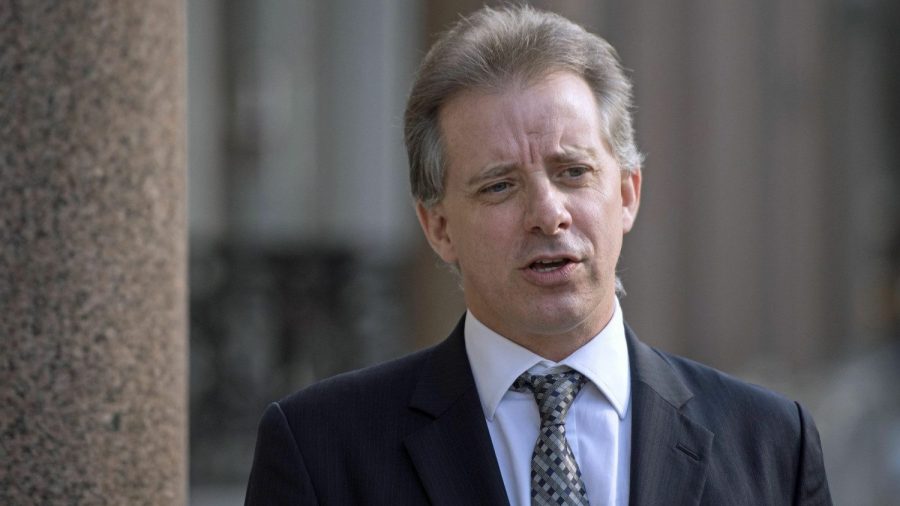The FBI was advised that a portion of the infamous Steele dossier was likely the product of a Russian disinformation campaign meant to harm U.S. foreign relations, according to previously-redacted footnotes from the inspector general report on the investigation of the Trump campaign.
A source also informed the FBI that former British intelligence officer Christopher Steele, the author of the dossier, had frequent contacts with Russian oligarchs, which raised concerns at the bureau’s Transnational Organized Crime Intelligence Unit, one of the declassified footnotes says.
The Department of Justice released the footnotes (pdf) in response to a request from Sens. Ron Johnson (R-Wis.) and Chuck Grassley (R-Iowa.).
Steele’s dossier played a crucial role in the FBI’s decision to apply for a Foreign Intelligence Surveillance Act (FISA) warrant to spy on Trump campaign adviser Carter Page. The Hillary Clinton campaign and the Democratic National Committee ultimately funded the dossier.
“In addition to the information in Steele’s Delta file documenting Steele’s frequent contacts with representatives of Russia oligarchs, we identified reporting the Crossfire Hurricane team received from [redacted] indicating the potential for Russia disinformation influencing Steele’s election reporting,” one of the footnotes states.
Crossfire Hurricane is the FBI’s code name for the investigation of the Trump campaign. Key officials on the Crossfire Hurricane team harbored an intense bias against then-presidential candidate Donald Trump, a prior inspector general’s report concluded. Special agent Peter Strzok and FBI attorney Lisa Page exchanged text messages about stopping Trump from becoming president, an insurance policy in case he was elected, and the prospect of impeachment around the time the pair joined the special counsel’s Russia investigation.

According to the newly declassified footnote, the bureau received a report in 2017, which assessed Steele’s reporting on Trump’s personal attorney, Michael Cohen, to be part of a Russian disinformation campaign.
“The [redacted] stated that it did not have high confidence in this subset of Steele’s reporting and assessed that the referenced subset was part of a Russian disinformation campaign to denigrate U.S. foreign relations,” the footnote states.
The FBI received the report cited in the footnote sometime after the bureau secured a FISA warrant to spy on Page. However, the dates in the footnote are still partly redacted, making it impossible to tell whether the bureau received the report during or after its year-long surveillance operation, which concluded in October 2017.
Grassley and Johnson expect the footnotes to be further declassified in the next few days, according to a statement.
Steele’s contacts with the lawyer of at least one Russia oligarch, Oleg Deripaska, have already been reported. The footnotes do not reveal the names of the other oligarchs.
One footnote shows that the FBI failed to thoroughly review Steele’s file before securing a warrant to spy on Page. If the agents had done so, they would have discovered the documented concerns about Steele’s many contacts with the representatives of Russian oligarchs.
Steele’s handling agent “expressed concern that the Crossfire Hurricane team did not access Steele’s file earlier. He said that the team should have ‘turned the file upside down’ looking for information 2 months earlier and that he assumed that some members of the team had thoroughly reviewed the file.”
Another footnote shows that the FBI learned that one of Steele’s sources was linked to the Russian Intelligence Service, and was rumored to be a former Russian intelligence officer.
In a joint statement, Grassley and Johnson said that if the FBI leadership heeded the warnings about the disinformation, “everyone would have been better off.”
“Carter Page’s civil liberties wouldn’t have been shredded, taxpayer dollars wouldn’t have been wasted, the country wouldn’t be as divided, and the FBI’s reputation wouldn’t be in shambles,” the senators said.
“It’s ironic that the Russian collusion narrative was fatally flawed because of Russian disinformation. These footnotes confirm that there was a direct Russian disinformation campaign in 2016, and there were ties between Russian intelligence and a presidential campaign—the Clinton campaign, not Trump’s.”
The revelation from the declassified footnotes is another black eye for the FBI, already undergoing wide-ranging reforms in response to the findings of the Page FISA inquiry by the inspector general (IG). The watchdog’s report detailed 17 serious errors and omissions in the Page FISA applications.
The Foreign Intelligence Surveillance Court issued a rare public reprimand to the FBI in response to the IG report and ordered the bureau to document why its FISA applications should ever be trusted again. The bureau embarked on a list of reforms in response but was castigated yet again when the IG found issues with 29 FISA applications reviewed in a follow-up audit.
The Crossfire Hurricane investigation evolved into the special counsel probe by Robert Mueller, who found no evidence to establish that Trump, or anyone on his campaign, colluded with Russia.
“For years, the public was fed a healthy diet of leaks, innuendo and false information to imply that President Trump and his campaign were part of a Russian conspiracy to spread disinformation,” Grassley and Johnson said in a statement.
“The FBI’s blind pursuit of the investigation, despite exculpatory and contradictory information, only legitimized the narrative. The mounting evidence undercutting this narrative should have stopped the investigation early in its tracks. Instead, it took several years and millions in taxpayer dollars to conclude that the allegations were baseless.”


